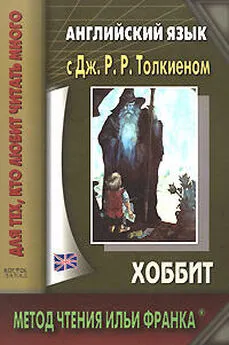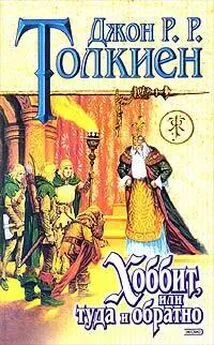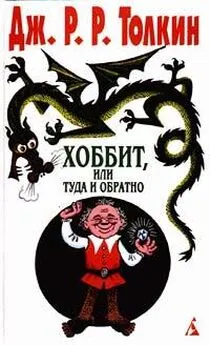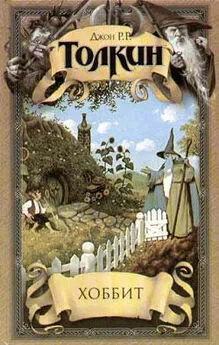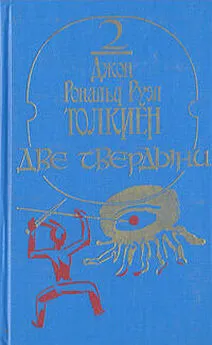Джон Толкиен - Английский язык с Дж. Р. Р. Толкиеном. Хоббит
- Название:Английский язык с Дж. Р. Р. Толкиеном. Хоббит
- Автор:
- Жанр:
- Издательство:АСТ, Восток-Запад
- Год:2008
- Город:Москва
- ISBN:978-5-17-048593-2, 978-5-478-00597-9
- Рейтинг:
- Избранное:Добавить в избранное
-
Отзывы:
-
Ваша оценка:
Джон Толкиен - Английский язык с Дж. Р. Р. Толкиеном. Хоббит краткое содержание
В книге предлагается произведение на английском языке Джона Р. Р. Толкиена «Хоббит», адаптированное (без упрощения текста оригинала) по методу Ильи Франка. Уникальность метода заключается в том, что запоминание слов и выражений происходит за счет их повторяемости, без заучивания и необходимости использовать словарь.
Пособие способствует эффективному освоению языка, может служить дополнением к учебной программе.
Предназначено для студентов, для изучающих английский язык самостоятельно, а также для всех интересующихся английской культурой.
Пособие подготовила Ольга Ламонова.
Английский язык с Дж. Р. Р. Толкиеном. Хоббит - читать онлайн бесплатно полную версию (весь текст целиком)
Интервал:
Закладка:
“Well, here is Mirkwood (ну, вот и Мрачный лес)!” said Gandalf. “The greatest of the forests (величайший из лесов) of the Northern world (Северного мира). I hope you like the look of it (я надеюсь, вам нравится, как он выглядит: «вам нравится его вид»). Now you must send back (теперь вам надо отправить назад) these excellent ponies (этих отличных пони) you have borrowed (которых вы одолжили; to borrow — занимать, брать на время ). ”
silence [ˈsaɪlǝns] gnarled [nɑ: ld] ivy [ˈaɪvɪ]
Next day they started before dawn, though their night had been short. As soon as it was light they could see the forest coming as it were to meet them, or waiting for them like a black and frowning wall before them. The land began to slope up and up, and it seemed to the hobbit that a silence began to draw in upon them. Birds began to sing less. There were no more deer; not even rabbits were to be seen. By the afternoon they had reached the eaves of Mirkwood, and were resting almost beneath the great overhanging boughs of its outer trees. Their trunks were huge and gnarled, their branches twisted, their leaves were dark and long. Ivy grew on them and trailed along the ground.
“Well, here is Mirkwood!” said Gandalf. “The greatest of the forests of the Northern world. I hope you like the look of it. Now you must send back these excellent ponies you have borrowed. ”
The dwarves were inclined to grumble at this (на это гномы очень хотели поворчать; inclined — наклонный, проявляющий склонность; to incline — быть склонным к, склоняться к /какой-либо мысли/ ), but the wizard told them they were fools (на что волшебник сказал им, что они глупцы).
“Beorn is not as far off (Беорн не так уж и далеко) as you seem to think (как вы, кажется, думаете), and you had better keep your promises anyway (и вам все-таки лучше сдержать свои обещания, в любом случае), for he is a bad enemy (так как он очень опасный враг; bad — плохой, дурной ). Mr. Baggins’ eyes are sharper than yours (зрение мистера Бэггинса острее вашего), if you have not seen (если вы не увидели) each night after dark (каждую ночь, после /наступления/ темноты) a great bear going along with us (большого медведя, следующего с нами) or sitting far of in the moon (или сидящего вдалеке в лунном свете) watching our camps (и наблюдающего за нашим лагерем). Not only to guard you (и не только для того, чтобы защищать вас) and guide you (и направлять вас), but to keep an eye on the ponies too (но также и для того, чтобы присматривать за пони; to keep an eye on — глаз не спускать: «держать глаз на» ). Beorn may be your friend (Беорн может быть вашим другом), but he loves his animals as his children (но он любит своих животных, как своих детей). You do not guess (вы даже и не предполагаете) what kindness he has shown you (какую доброту он оказал вам; to show — показывать ) in letting dwarves ride them (позволив гномам проскакать/проехать на них) so far and so fast (так далеко и так быстро), nor what would happen to you (ни то, что может с вами случиться), if you tried to take them into the forest (если вы попытаетесь взять их с собой в лес). ”
“What about the horse, then (а как же тогда конь)?” said Thorin. “You don’t mention sending that back (вы не упомянули о том, чтобы отправить и его назад). ”
“I don’t, because I am not sending it (я не упомянул об этом потому, что я не отправляю его). ”
“What about your promise then (а как же тогда ваше обещание)?”
“I will look after that (я об этом позабочусь сам; tolookafter — присматривать, ухаживать, заботиться ). I am not sending the horse back (я не отправляю своего коня назад), I am riding it (я поскачу на нем /назад/)!”
Then they knew (тогда они поняли) that Gandalf was going to leave them (что Гэндальф собирался оставить их) at the very edge of Mirkwood (у самого края Мрачного Леса), and they were in despair (и они были в отчаянии).
But nothing they could say (но ничего, что они могли сказать) would change his mind (не изменило бы его решения).
inclined [ɪnˈklaɪnd] guide [ɡaɪd] despair [dɪsˈpeǝ]
The dwarves were inclined to grumble at this, but the wizard told them they were fools. “Beorn is not as far off as you seem to think, and you had better keep your promises anyway, for he is a bad enemy. Mr. Baggins’ eyes are sharper than yours, if you have not seen each night after dark a great bear going along with us or sitting far of in the moon watching our camps. Not only to guard you and guide you, but to keep an eye on the ponies too. Beorn may be your friend, but he loves his animals as his children. You do not guess what kindness he has shown you in letting dwarves ride them so far and so fast, nor what would happen to you, if you tried to take them into the forest. ”
“What about the horse, then?” said Thorin. “You don’t mention sending that back. ”
“I don’t, because I am not sending it. ” “What about your promise then?”
“I will look after that. I am not sending the horse back, I am riding it!”
Then they knew that Gandalf was going to leave them at the very edge of Mirkwood, and they were in despair.
But nothing they could say would change his mind.
“Now we had this all out before (ну же, мы выяснили этот вопрос раньше; to have (had) out — удалять, выяснить отношения ), when we landed on the Carrock (когда мы высадились на скале Каррок), ” he said. “It is no use arguing (спорить бесполезно; to argue — спорить, приводить доводы ). I have, as I told you (у меня, как я уже сказал вам), some pressing business away south (одно неотложное дело там, на юге; to press — жать; торопить ); and I am already late (и я уже опаздываю) through bothering with you people (из-за того, что хлопочу тут с вами, народ = ребята; to bother — надоедать, беспокоить, трудиться ). We may meet again (мы, может, встретимся снова) before all is over (до того как все это закончится; to be over — окончиться, завершиться ), and then again of course we may not (и возможно опять же, что мы и не /встретимся/). That depends on your luck (это зависит от вашей удачи) and on your courage (и от вашего мужества) and sense (и благоразумия); and I am sending Mr. Baggins with you (и я отправляю с вами мистера Бэггинса). I have told you before (я уже сказал вам раньше) that he has more about him (что у него с собой есть больше /способностей, возможностей/) than you guess (чем вы предполагаете), and you will find that out (и вы это выясните) before long (очень скоро). So cheer up Bilbo (ну же, веселей, Бильбо; to cheer — веселить, подбадривать ) and don’t look so glum (и не выглядите таким угрюмым). Cheer up Thorin and Company (не унывайте Торин и Компания)! This is your expedition after all (это же ваша экспедиция, в конце концов: «после всего»). Think of the treasure at the end (подумайте о сокровище /что ждет вас/ в конце), and forget the forest and the dragon (и забудьте о лесе и о драконе), at any rate until tomorrow morning (во всяком случае, до завтрашнего утра)!”
argue [ˈɑ: ɡju: ] courage [ˈkʌrɪdʒ] expedition [ekspɪˈdɪʃ (ǝ) n]
“Now we had this all out before, when we landed on the Carrock, ” he said. “It is no use arguing. I have, as I told you, some pressing business away south; and I am already late through bothering with you people. We may meet again before all is over, and then again of course we may not. That depends on your luck and on your courage and sense; and I am sending Mr. Baggins with you. I have told you before that he has more about him than you guess, and you will find that out before long. So cheer up Bilbo and don’t look so glum. Cheer up Thorin and Company! This is your expedition after all. Think of the treasure at the end, and forget the forest and the dragon, at any rate until tomorrow morning!”
When tomorrow morning came (когда наступило завтрашнее утро) he still said the same (он опять сказал тоже самое). So now there was nothing left to do (так что теперь ничего не оставалось сделать) but to fill their water-skins (как наполнить их бурдюки для воды) at a clear spring (из чистого ручья) they found close to the forest-gate (который они обнаружили недалеко от ворот в лес), and unpack the ponies (и развьючить пони). They distributed the packages (они распределили груз) as fairly as they could (поровну: «так честно, как только они могли»), though Bilbo thought his lot was wearisomely heavy (хотя Бильбо считал, что его поклажа была утомительно тяжелой; lot — жребий, судьба, доля, участь ), and did not at all like the idea (и ему совсем не нравилась идея) of trudging for miles and miles (тащиться многие и многие мили; to trudge — идти с трудом, устало, продираться ) with all that on his back (со всем этим на спине).
“Don’t you worry (не волнуйтесь же вы)!” said Thorin. “It will get lighter all too soon (она /поклажа/ полегчает слишком скоро). Before long I expect (вскоре, я так думаю) we shall all wish our packs heavier (мы все будем желать, чтобы наши ранцы были бы потяжелее; a pack — тюк, узел, пакет, снаряжение ), when the food begins to run short (когда пища начнет подходить к концу; to run — бежать; short — короткий; to run short — иссякать, кончаться ). ”
Читать дальшеИнтервал:
Закладка:
